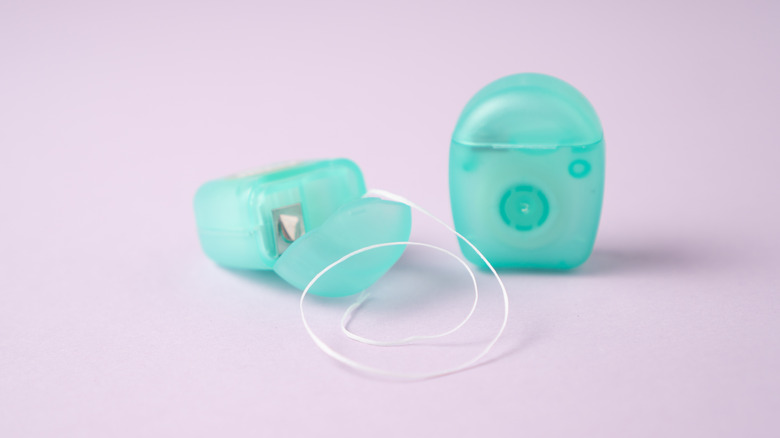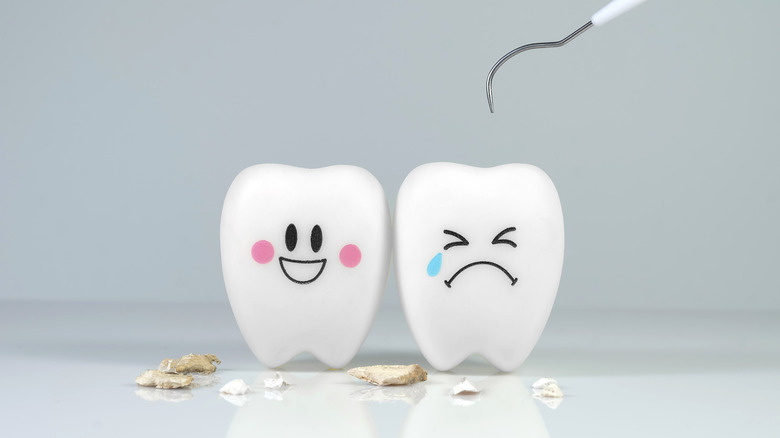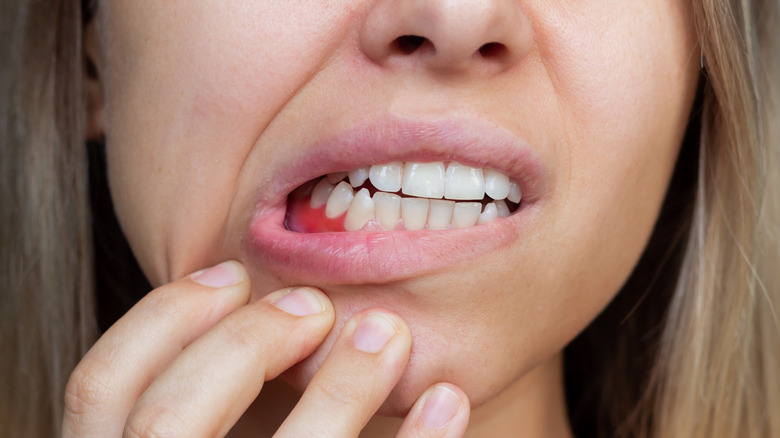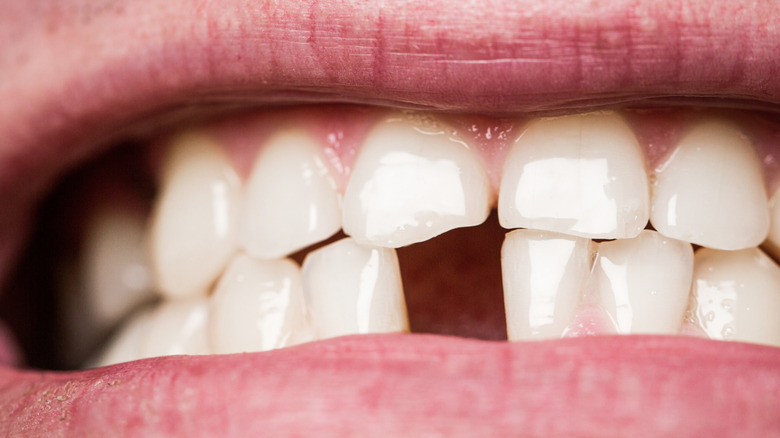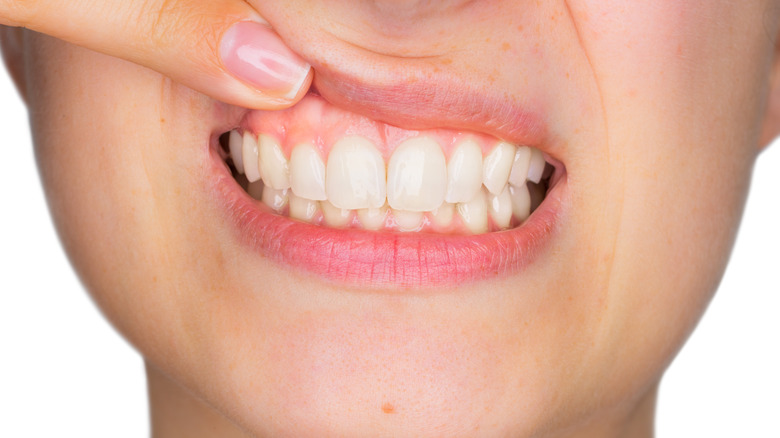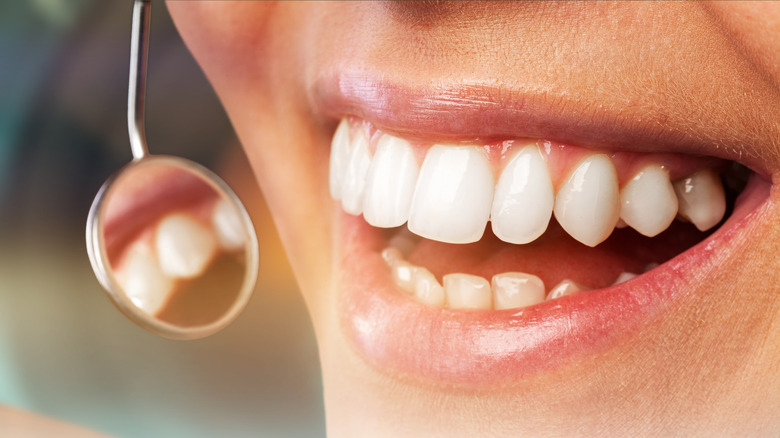What Happens To Your Teeth When You Floss Every Day
We all probably have one friend who is a self-proclaimed exceptional flosser, which is good for them and their responsible, better-than-everyone-else ways. Overachievers, right? We are talking about flossing your teeth, not the dance move, FYI. But we often wonder if their actual mouth cleanliness reflects their impeccable oral hygiene. Twice annually, dentists tell us to floss more consistently. But is flossing everyday really that important? And what really happens if you commit to daily flossing? We would venture to assume that most people do not floss daily, or do they? Does flossing everyday really offer all of the health benefits that our dentists say it does?
We set out in search to find out if inter-dental cleaning (seriously) is truly a habit that we should be doing daily, or if it is acceptable to squeak by on once a week. The ins and outs of flossing, plaque removal, and overall oral hygiene are straightforward and to-the-point. We learned that the better your hygiene, the better your oral health will be in (via Mouth Healthy). So, here are all of the benefits available to you if you choose to start flossing as a part of your daily routine.
It's good for your overall health
That's right — flossing every day has health benefits that are far greater than just a whiter smile and fresher breath. Ensuring that you clean between your teeth has a trickle down effect and can impact your future health. Many studies have emerged proving that periodontal disease is linked to heart disease and other health problems (via Harvard Health Publishing). Periodontal disease is a fancy way of saying that you have an infection in your gums (via Centers for Disease Control and Prevention). It is fairly common, but can also have a catastrophic impact on your teeth, and on your body as a whole.
The theory behind this is fascinating and the research is ongoing. Researchers and experts believe that infections within the mouth can lead to inflammatory conditions in the bloodstream throughout the body (via Oral B). This can slow the rate of blood flow to the heart and increase the levels of inflammatory substances in the blood. Another reason why periodontal disease might be linked to heart disease is because the bacteria from your mouth can enter your bloodstream, and thus travel to your heart.
You'll reduce your risk of cavities
Cavities are pesky, painful, damaged areas on surfaces of your teeth — and this damage is permanent (per Mayo Clinic). Bacteria buildup is one of the main things that leads to the development of cavities. The overgrowth in bacteria can occur from improper cleaning habits, or from constantly sipping or snacking on sugary foods and drinks. The bacteria can bore tiny holes into your tooth enamel; dentists use fillings to permanently fill the holes and prevent them from getting worse and causing damage to the root of the tooth. When damage is left unchecked, your susceptibility to needing a root canal or other, more aggressive remedies increases by a lot.
Daily flossing is not the main thing that prevents cavities, but flossing definitely contributes to a cleaner mouth (via WebMD). Flossing helps remove food from between the teeth that can cause tooth decay and inflammatory conditions. Furthermore, in conjunction with twice-daily brushing, flossing helps keep your mouth spic and span. The fewer particles you have stuck between your chompers, the less likely bacteria is to proliferate.
It helps remove plaque
Plaque is defined as a sticky film of bacteria that coats the surface of the teeth, which sounds super gross (via Medical News Today). Tartar is the hard, calcified deposits of plaque that have not been properly cleaned. Plaque can be removed with consistent brushing, but once it turns into tartar, it can only be removed by a dental professional.
Luckily, daily flossing is a great way to keep your plaque at bay and decrease the incidence of tartar buildup. Plaque contains bacteria that feeds off of leftover food and sugar in your mouth. The acid that is released by the bacteria is one of the things that leads to enamel damage and thus, cavities. While most plaque can be removed with a good brushing routine, it can build up in hard-to-reach places that only a wax-coated string can reach (via Mouth Healthy). To ensure that you keep your mouth as plaque and tartar free as possible, daily flossing is a must.
Your gums will be healthier
Healthy gums, flossing, and gum sensitivity all come together to create a real double-edged sword when it comes to oral hygiene. On one hand, people avoid flossing because it can be painful and can make your gums bleed. But the more you inflict this pain upon yourself, the more likely you are to actually decrease the incidence of bloody and painful flossing experiences (per Green Hill Dental). Gum disease, often called gingivitis in the early stages, is a condition in which you gums become painfully inflamed, which is often the cause of bleeding while flossing (per Southwest Smiles). Though it might be a pain in the gums to start, habitual flossing is a great way to keep the spaces between teeth clean, freshen breath, and prevent a whole lot of pain and suffering down the line. Just make sure that you consult your dentist about the best ways to floss gently if you experience a lot of pain.
You are less likely to lose your teeth
Some people live in fear of losing their teeth, seriously. In order to rationally combat this fear, we recommend daily flossing (via Southwest Smiles). If you develop gum disease, the risk of losing your teeth increases dramatically. Damaged guns can cause your teeth to become so loose that they eventually fall out (though loose teeth often need to be removed by a dentist). No matter how it happens, unchecked gum disease can result in the loss of one or more teeth, which has to be painful, uncomfortable, and expensive should you choose to replace them (via John T. Green DDS Inc.). It is super important to understand what the early stages of gum disease look like so that you can prevent it from spiraling into a much bigger problem. By identifying swollen, red, and painful gums as gingivitis (via American Academy of Periodontology), you will be able to up your flossing game to ensure that the damage doesn't persist or worsen. If you already have advanced gum disease, it is best to seek out dental assistance sooner rather than later to prevent further pain and suffering.
You'll experience less gum recession
As we are sure you've noticed, flossing is highly intertwined with the health of your gums. Gum recession is yet another painful dental ailment that can result from insufficient flossing (via Southwest Smiles). Gum recession is what happens when your gums actually start to pull away from your teeth. This can actually expose the roots of your teeth, causing painful, nerves-on-fire sensations. In less severe cases, gum recession causes milder tooth sensitivity and creates small pockets between your teeth and gums. These small crevices are the perfect places for bacteria to grow and proliferate. If gum recession is left unchecked, it can balloon into more pressing and painful problems — one of which, predictably, is the loss of your teeth (per WebMD).
Aggressive brushing can also lead to gum recession, so over-brushing is not a healthful or effective way to make up for a lack of flossing. If you suspect that you might have some gum recession, it is best to see a dentist early on to avoid further complications.
You are less likely to develop periodontitis
Periodontitis is a severe gum disease that can damage the soft tissues surrounding your teeth (via Mayo Clinic). Periodontitis is completely preventable with proper oral hygiene, but can spiral and — you guessed it — result in tooth decay and loss. While daily flossing is one way to avoid developing periodontitis, there are other activities and habits that can increase your risk of developing it. The use of tobacco products, recreational drugs, pregnancy, HIV/AIDS, obesity, a vitamin C deficiency, and a few other conditions can increase your risk. If you fall into any of those categories, flossing consistently will surely benefit your quest for a clean mouth.
One of the most concerning complications associated with periodontitis is the bacterial growth. If the bacteria is permitted to grow out of control, it can lead to respiratory problems, rheumatoid arthritis, and issues controlling blood sugar in people with diabetes. To avoid periodontitis and the myriad problems associated with it, experts at the Mayo Clinic recommend flossing at least once a day. Oral B even recommends flossing after each meal to dislodge any rogue food particles that may be trapped and awaiting an opportunity to sabotage your oral health.
Your chances of developing other infections will decrease
As we've mentioned, proper oral hygiene can impact your health on a much larger scale. In addition to bacterial overgrowth being linked to health complications like heart disease, poor oral care can affect your body in other ways, too (via Meyer Dental). Even if you are able to avoid getting a true mouth infection, that doesn't mean you are safe from the havoc that the out-of-control bacteria wants to inflict upon your body. Mouths that are not cared for properly have an increased risk of housing pathogens that could potentially travel and cause problems elsewhere. These oral conditions become especially problematic if you cut your cheek or gums. A small abrasion can give the pathogens a perfect opportunity to enter the bloodstream and travel around until they find a zone in which to cause destruction and proliferate. In severe cases, dental abscesses can turn into fatal brain infections. With a fatal brain infection potentially on the line, we think it's best to suck it up and spend the five minutes before bed flossing, no matter how tired we are.
Your breath will be better
We've all been around someone with extremely bad breath, or halitosis, and we know how unbecoming it can be. By flossing every day you decrease your chances of being that person , which is certainly worth the effort (per Mayo Clinic). Constantly chewing gum or sucking on mints might mask the problem, but it isn't a good way to treat the underlying cause of the stink.
As you have definitely noticed, flossing is the best way to remove hidden and stuck food particles from the depths of your mouth. When left between teeth, these food particles start to break down and stink (via Green Hill Dental). That stench is often what leads to bad breath. If regular brushing isn't a part of your oral hygiene routine, you likely have a lot of plaque and tartar, which can also contribute. The best way to avoid bad breath is by keeping your mouth clean and by vanquishing those food particles on a daily basis.
Your tooth enamel will stay stronger for longer
Tooth enamel is what coats the outsides of your chompers (via WebMD). It is an incredibly hard substance that is meant to last a lifetime when it is cared for properly. Failure to remove the sticky, nasty plaque from your teeth can slowly begin to wear down the integrity of your tooth enamel. Once the enamel gets worn down, your risk of tooth decay and potential tooth loss (you saw that coming) increases.
Since flossing helps to remove the plaque that gets stuck in between your teeth, it also decreases your risk of the interdental enamel breaking down. Plaque and tartar are not the only things that wear down your tooth enamel. Chewing on ice, grinding your teeth, or opening bottles with your teeth are all excellent ways to degrade the strength of your teeth's coating. Of course, your enamel will begin to wear away a bit as you age, but with proper care you can keep it strong and intact for as long as you can. And according to Healthline, flossing can actually help strengthen the enamel between the teeth. This is yet another reason why daily flossing is so important.
Your smile will be brighter
We are sure this has happened to you. You're walking along and see someone attractive, your eyes meet, and then they smile — only to expose yellowed, unhealthy looking teeth. While plaque-coated tusks are not a deal-breaker for everyone, many people strive to have the cleanest, whitest teeth possible.
Daily flossing has aesthetic benefits to round out the host of health benefits that is offers (via Healthline). Plaque creates tartar, which in turn dims the shine of your smile. Flossing removes the plaque, which can lead to a brighter, whiter, and more dazzling grin. The sheen of your smile does not rest solely on flossing, but it definitely contributes to the cleanliness and overall health. Flossing, visiting a dentist regularly, brushing twice a day for two minutes, and decreasing your intake of discoloring substances can all help up the wattage of your smile. Even if you decide not to give up smoking, coffee, wine, and tea, good oral hygiene habits will certainly give you a leg up when maintaining the brilliance of your smirk.
You could have a healthier pregnancy
This is the most surprising thing we have discovered about daily flossing. We all know that it's is an incredibly important part of an overall healthy lifestyle, but before and during pregnancy, daily flossing is particularly vital — which makes sense given how bacteria can grow in your mouth and cause chaos throughout your body (via Meyer Dental). As it turns out, gum disease puts pregnant women, or women who may become pregnant, at risk of premature birth and low birth weights (via Fit to Smile Dental).
Not only do fetuses in utero need to be protected by way of oral hygiene, but pregnant women in general are more susceptible to dental complications because of hormone fluctuations (via WedMD). Hormones affect the available blood supply for the gums and also change the way the body responds to the bacteria that is often introduce via plaque. Because of the hormonal changes, women are most susceptible to periodontal disease at a few different stages of their lives. These stages include puberty, during pregnancy, and menopause, fairly predictably. But women also are more prone to oral issues during certain phases of their menstrual cycles and while taking birth control pills. In addition to standard hygiene practices, WedMD recommends the use of fluoride as a mouthwash or in your toothpaste.


